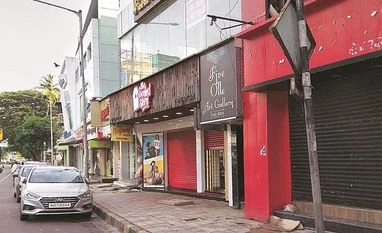With little signs of revival in their business, retailers have urged the state and local authorities to ease localised lockdowns.
Ad-hoc lockdowns, they said, have been counterproductive since the country entered Unlock 2.0 on July 1.
Imposed by over a dozen states, ad-hoc shutdowns have not only quashed hopes of any recovery but could add to the rising Covid-19 count, they argued.
The Retailers Association of India (RAI), a not-for-profit organisation representing the rights of retailers, is making representations to state governments and local authorities, seeking permit for longer hours of operations.
The arbitrary lockdowns, imposed by different bodies in different areas spread across the country, have only compounded their woes, they rued.
In its first leg, the RAI has approached the authorities in Uttar Pradesh (UP), Maharashtra, Andhra Pradesh, and Karnataka, apart from respective state secretariats.
“The need of the hour is concerted efforts by all stakeholders. While retailers are doing their bit by following stringent hygiene practices, policymakers, too, need to ensure economic revival. Only consumption can support the business environment,” said Kumar Rajagopalan, chief executive officer (CEO), RAI.
The demands from retailers are fourfold: One, allow kiranas, general trade stores, supermarkets, hypermarkets, and wholesalers to operate every day of the week till 9 pm.
Two, ensure uniform and regular opening of all categories of retail. “This will help avoid overcrowding outside stores since demand will get evenly distributed over all days of the week,” they said.
Three, hassle-free movement of goods and employees.
Four, lift bans on malls in states like Maharashtra.
Retailers have argued that arbitrary rules followed by agencies in different regions are causing more harm than good to beleaguered business owners.
“The ad-hoc restrictions that keep changing create confusion about what is allowed and what is not. The restrictions imposed by state governments are further compounding the situation and posing significant operational issues,” they said.
According to Arvind Mediratta, managing director and CEO, METRO Cash & Carry India, “The decision to close all stores on weekends in UP and to reinforce stringent lockdown in Bengaluru is going to severely impact business. These lockdowns will inconvenience all citizens as they also bar operations of food and grocery retail and wholesale stores.”
The wholesale retail giant has witnessed severe disruption in its operations in recent weeks due to the ad-hoc lockdowns.
He said METRO has implemented rigorous safety measures at all its stores and has, so far, been successful in making them 100 per cent safe for both employees and customers.
“We would request the governments of both Karnataka and UP to allow unhindered operations of food and grocery retail and wholesale stores. Such hastily implemented decisions by states undermine investor confidence and would come in the way of making the country ‘atmanirbhar’ (self-reliant),” said Mediratta.
Sandeep Kataria, CEO, Bata India, said, “Restricted shopping time can lead to unnecessary overcrowding at stores, which is unfavourable towards the personal safety of both store staff and customers. Longer operational hours will support recovery for retailers as well as help adhere to social distancing norms.”
According to Himanshu Chakrawarti, CEO, Unlimited from Arvind Lifestyle Brands, “Customer convenience and preventing crowding are served best by having regular retail timings. Odd-even dates or few hours’ trading time inconveniences customers and results in overcrowding. I request the local authorities to take a larger contextual view and issue notifications with more stable working days and timings to ensure customer safety and convenience.”
Currently, ad-hoc lockdowns are in place in at least 14 states, including West Bengal, UP, Maharashtra, Madhya Pradesh, Andhra Pradesh, Tamil Nadu, Karnataka, Assam, Odisha, Punjab, Jharkhand, Karnataka, Haryana, Uttarakhand, and Bihar.
With the number of reported Covid-19 cases surging everyday, more regions are being added to the list.
West Bengal on Monday announced total lockdown for two days every week. In Bengaluru, the lockdown has been extended till July 27 in certain pockets.
These come at time when retailers are grappling with tepid sales.
According to a recent survey by RAI, high-street retailers across India managed to recover only about 38 per cent of their business during the second half of June. For malls, the figure is much lower at 23 per cent. The data shows retailers in western India are the worst affected, with sales at 26 per cent, followed by North India (29 per cent) and East and South (both at 38 per cent).
Unlock 30+ premium stories daily hand-picked by our editors, across devices on browser and app.
Pick your 5 favourite companies, get a daily email with all news updates on them.
Full access to our intuitive epaper - clip, save, share articles from any device; newspaper archives from 2006.
Preferential invites to Business Standard events.
Curated newsletters on markets, personal finance, policy & politics, start-ups, technology, and more.
)